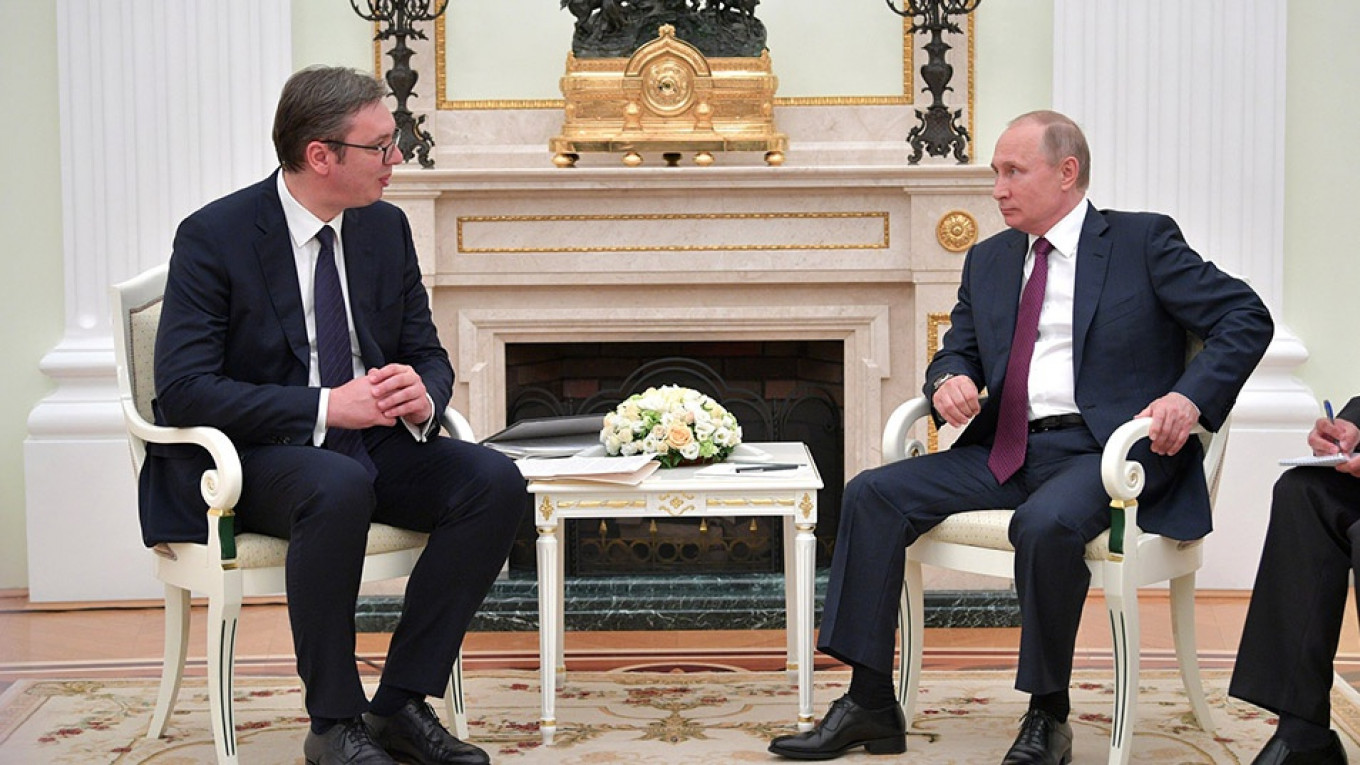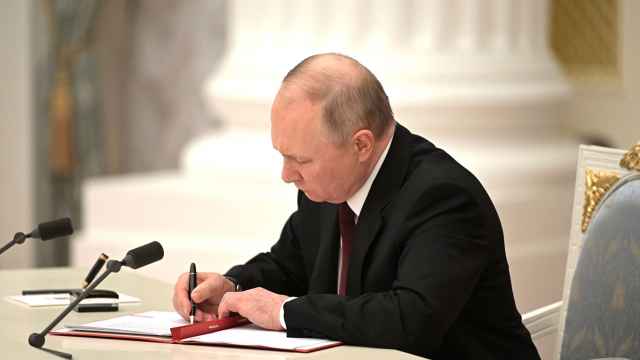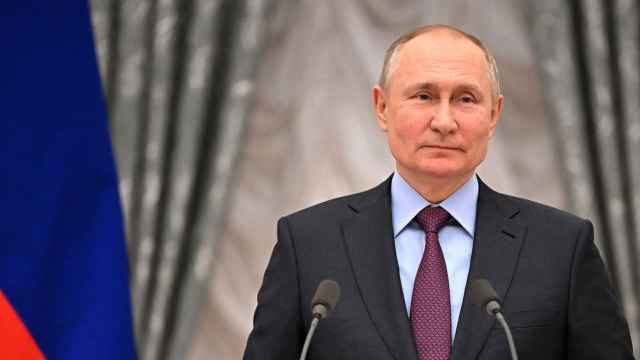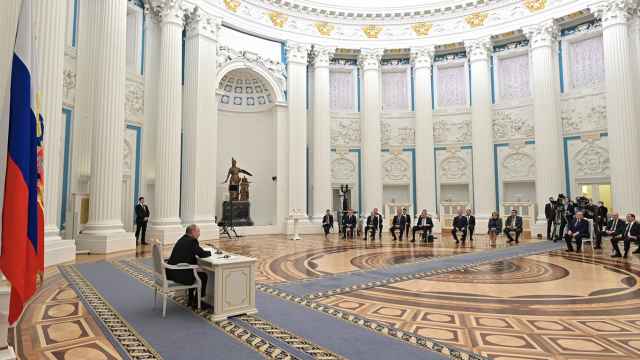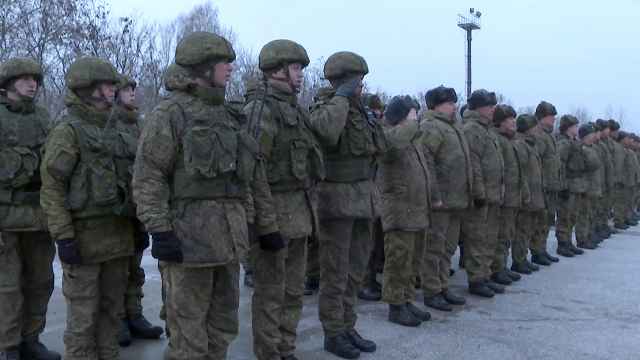When Vladimir Putin lands in Belgrade, the ruling party will welcome him as the country’s most popular foreign politician with a rally that underscores Serbia’s conflicted approach to joining the European Union.
President Aleksandar Vucic’s Serbian Progressive Party, which is itself facing anti-government protests, is mobilizing thousands of its members in the capital on Thursday in show of support for the Russian leader. Vucic will be looking to leverage Moscow’s support in striking a deal to normalize ties with Kosovo, one of the biggest hurdles to both Balkan countries’ aspirations for EU membership.
With the outreach effort, Vucic is sending a signal that he doesn’t accept EU opposition to a deal with Kosovo to redraw their borders. Vucic and his Kosovo counterpart have turned to Moscow and Washington for support for such a deal. But European leaders fear new demarcations could incite similar demands and trigger the kind of ethnic strife that tore apart Yugoslavia and killed more than 100,000 people during wars in the 1990s.
The visit may be “a warning signal to the EU” that “demonstrates a continuation of Serbia’s inconsistent foreign policy,” said Sena Maric, a senior researcher at the European Policy Center in Belgrade. The country “is supposed to completely align its foreign policy with the EU” while “a considerable number of EU member states perceive Serbia’s relationship with Russia as a matter of their national interest and are ready to block its EU membership.”
Anti-government protests
Since taking power as prime minister in 2012, Vucic has performed a balancing act, pledging to join the EU while also maintaining warm ties with Russia. His relationship with Putin is particularly close. The two have met more than a dozen times, and Russia awarded Vucic its highest honor earlier this year.
The relationship is now playing a role as Serbia tries to inch forward in talks with Kosovo, which declared independence in 2008, a decade after NATO-led bombing ended a war between the neighbors.
The talks screeched to a halt in November. The trigger was a 100 percent tax on Serbian goods imposed by Kosovo in retaliation to Belgrade’s successful effort to deny it membership in Interpol.
Serbia, aided by Russia and China, refuses to recognize Kosovo as a sovereign state and has blocked membership in the United Nations and other global organizations. Bound by culture and the Orthodox Church, the Balkan state lies within Russia’s former sphere of influence in ex-communist Europe, although the EU is by far the biggest foreign investor.
Chilly response
Dragging on for years, the dispute appeared to be near a breakthrough after the two sides floated the idea of redrawing their borders. But, met with the chilly response from the EU, Vucic and Kosovo President Hashim Thaci turned to their old allies. Russia has said it wants an accord that’s good for Serbia. U.S. President Donald Trump urged both sides to quickly reach a deal, with neither country rejecting the proposal.
The visit also underscores growing unrest against Vucic, who’s facing a second month of protests calling for his government to respect freedom of speech and the rule of law. Following the beating of an opposition politician, thousands of Serbs have taken to the streets in recent weeks in rallies that echo those in other eastern European countries including Poland and Hungary where protesters say their governments are backsliding on democracy.
Deputy Prime Minister Zorana Mihajlovic said that the greeting planned for Putin wasn’t an indication of Serbia’s foreign-policy stance.
"Serbia should have good relations both with the East and with the West," Mihajlovic said in a statement on Tuesday. "We want to be open, the way we are as people and as a country and to greet all statesmen of the world. This time it’s Putin, we’ll soon welcome French President Macron, just as we welcomed premier and president of China."
A Message from The Moscow Times:
Dear readers,
We are facing unprecedented challenges. Russia's Prosecutor General's Office has designated The Moscow Times as an "undesirable" organization, criminalizing our work and putting our staff at risk of prosecution. This follows our earlier unjust labeling as a "foreign agent."
These actions are direct attempts to silence independent journalism in Russia. The authorities claim our work "discredits the decisions of the Russian leadership." We see things differently: we strive to provide accurate, unbiased reporting on Russia.
We, the journalists of The Moscow Times, refuse to be silenced. But to continue our work, we need your help.
Your support, no matter how small, makes a world of difference. If you can, please support us monthly starting from just $2. It's quick to set up, and every contribution makes a significant impact.
By supporting The Moscow Times, you're defending open, independent journalism in the face of repression. Thank you for standing with us.
Remind me later.


